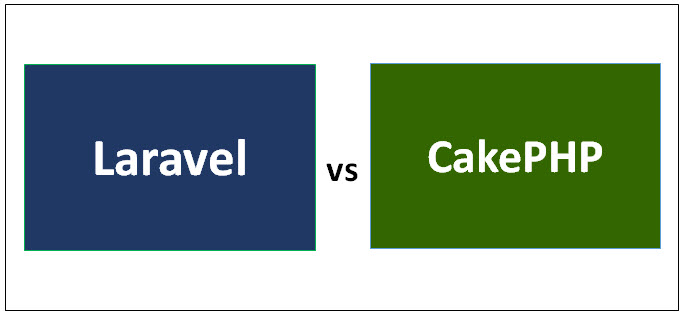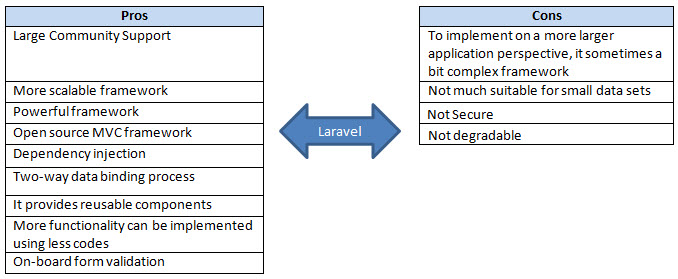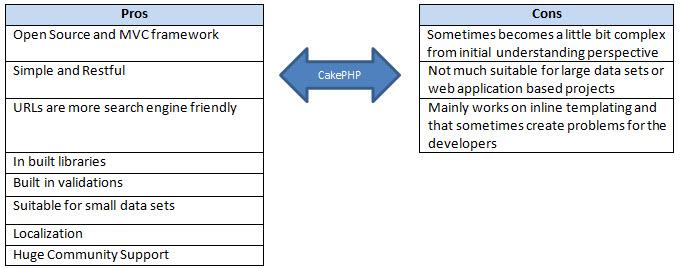
Difference between Laravel and CakePHP
Laravel is basically a powerful open-source MVC PHP framework that is mainly used to develop new, creative and elegant full-featured web applications. It offers a different set of basic functionalities of PHP frameworks. On the other hand, CakePHP is an open-source PHP framework. It is also implemented on MVC like powerful architecture. It is mainly implemented in maintaining, developing the applications in a much easier and convenient way. The presence of different libraries helps to implement the different features in a much easier way.
Features of Laravel
Find below a few important features of Laravel:
- Modularity: It has 20 inbuilt libraries that provide important features from the application built-in perspective.
- Configuration Management: It is used to run in different environments and thus helps to implement and maintain the configuration management in a more efficient way.
- Security and Authentication: It has different features like register, forgot password, send password reminders and also has 3 layers of authentication approach from the app development and security perspective.
- Testing: It has different inbuilt features that help to test different scenarios, and this also helps to maintain and enhance the development codes.
Pros and Cons between Laravel vs CakePHP
Following are some pros and cons of Laravel and CakePHP:
Laravel (Pros and Cons):
CakePHP (Pros and Cons):
Head To Head Comparison Between Laravel and CakePHP (Infographics)
Below is the top 8 difference between Laravel vs CakePHP
Key differences between Laravel and CakePHP
Both are popular choices in the market; let us discuss some of the major difference:
- Both CakePHP vs Laravel are open source frameworks, but Laravel comes free of cost, but the CakePHP is not.
- Laravel works on the object-oriented model, while CakePHP works on the document-oriented database model.
- Laravel is based on Model View Controller (MVC) architecture, while CakePHP has implemented on the Hierarchical Model View Controller (HMVC) architecture.
- Laravel is not suitable for smaller projects and becomes a bit complex for the same, while CakePHP is much more suitable for building small-scale projects.
- From the security benchmark perspective, CakePHP plays a more crucial role than that of Laravel
- CakePHP is a more convenient choice than that of Laravel in terms of routing perspective.
- From the scaling perspective, Laravel frameworks rise above the CakePHP framework, and this happens more while considering building large scale projects.
- Laravel framework is a much better choice than that of CakePHP in the case of rapid web development and enhancement perspective.
- Laravel framework is a much better choice than that of CakePHP in the case of data backup and handling perspective.
- In the case of Laravel, there is a compiler functionality exists while there is no such feature is present for CakePHP.
Laravel vs CakePHP Comparison Table
Below is the topmost comparison between Laravel vs CakePHP
| The basis of comparison |
Laravel |
CakePHP |
| Basic Performance | Laravel is one of the known open-sourced MVC frameworks and provides impactful performance for larger projects as it offers a two-way data binding process. | CakePHP provides much faster performance than Laravel in the case of small data sets or small projects. But for larger projects, it is not that much preferred as it doesn’t do any data binding process. |
| Architectural Performance | Laravel works on MVC architecture, and it uses two-way data binding to drive application activity. | CakePHP uses HMVC architecture, and it doesn’t provide any data binding process. |
| Performance-based on Templating | Laravel offers to the template through dynamic HTML attributes, which are added to the document to make an easy to understand application at a functional level. | CakePHP uses Underscore templates. These templates are not as fully-featured as those offered by Laravel |
| Performance Testing | Performance testing is more preferred in Laravel than CakePHP. Mainly in the case of a large application, testing is smoother through this framework. | CakePHP doesn’t provide any data binding process, and thus it mainly provides a swift testing experience for a single page or smaller applications. For big or multi-paged applications, it is less preferred than Laravel |
| Support and Performance Upgradation | Laravel has large community support and extensive documentation libraries. | CakePHP is also had one of the largest community supports. |
| Routing Performance | Laravel implements on a two-way binding process, and thus it is a bit complex and less preferable than CakePHP in terms of routing perspective. | CakePHP doesn’t provide any data binding and has a simple and easier approach towards routing than Laravel |
| Backup and Handling performance | Laravel has a better approach and thus is more preferable to CakePHP in terms of data backup and handling perspective. | CakePHP mainly works on smaller projects and thus is less preferable in terms of data backup and handling perspective. |
| Performance-based on advanced Features | Laravel mainly focuses on valid HTML and dynamic elements that mirror the underlying data to rebuild the web element for large applications as per the specified rules. It then works on the updated data records. | CakePHP works on direct MVC architecture and a smaller application manipulation approach to represent changes in data and application architecture. |
Conclusion
After comparing Laravel vs CakePHP over a range of factors, it can be concluded that Laravel vs CakePHP has its own pros and cons. So, before choosing any one of the frameworks, developers should learn and analyze different aspects of both CakePHP vs Laravel. Thus, based on the type of project need, time of work, and other discussed aspects, any of these frameworks should be selected to reach the desired goal.
Recommended Articles
This has been a guide to the top difference between Laravel vs CakePHP. Here we also discuss the key differences with infographics and comparison table. You may also have a look at the following articles to learn more –



